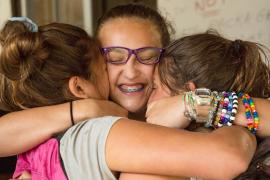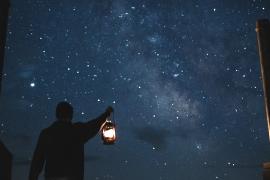At this year’s ACA National Conference in Atlanta I had the privilege of co-hosting the unfortunately titled session: “Breakfast with the Legends.” Our intrepid conference chair reported that young professionals had been expressing the desire to meet elders in our field and to learn from their combined total of perhaps 500 years of experience. So a breakfast with bagels was arranged.
In case conversation needed a boost, we created a short list of questions we thought early career professionals might find interesting — such as, “What would you tell your 20-year-old self today?” and “What is the biggest lesson you have learned in all these years?” We needed only a few, as the ball started rolling and the conversation — and it was a conversation, not a lecture — became both profound and fun.
As I listened to my longtime friends share memories and wisdom, I asked myself the question from our list that most interested me: “What is the biggest lesson I have learned in my over-50-year career in this wonderful profession?” And the answer, though more complicated to explain than I would have hoped, came immediately and demanded sharing.
It may sound pretty simple, but my answer to that question was: Know what you believe.
A bit of history: A million years ago in my first year as director, I looked out across the fields of my camp, Aloha Hive, in Fairlee, Vermont, and watched with pride as I saw young counselors mingling and mixing with campers, just as I had trained them to do. They were loving and helpful, paying careful attention, being exactly the kind of counselors I had hoped they would be. Then, over in a corner of the field, I noticed an earnest counselor — one of our youngest — in an intense conversation with a ten-year-old camper in obvious distress. Was it homesickness, I wondered, or was this first-year camper sharing her pain and confusion over a pretty complicated home life? As I stood there, I realized I had no idea what this young counselor was saying. Was she merely being kind and empathetic, or was she bringing out her best insights gleaned from Psychology 101?
I had trained my staff on discipline and rewarding positive behavior. I had taught folks the ins and outs of camp policy and procedure. We had gone over and even tried out teaching techniques, and we had practiced every kind of risk management we could imagine — except one. We had not thought through, articulated, or codified our basic beliefs about human behavior. We had not taught our underlying understandings about how people grow. We had not demanded clarity about the methods or pedagogy we would use and teach to help children reach our lofty goals of increased self-esteem, self-reliance, and independence. We set the goals and trained those wonderfully young and eager counselors well in some things, but when it came to our baseline beliefs about human behavior and how growth happens for folks, we had left them on their own to use the resources they had absorbed — or not absorbed — in various classes or with various mentors somewhere else in their lives. Talk about a risk management issue: What could be more dangerous than an unskilled attempt at psychoanalysis?
Luckily for the Aloha Foundation — and for me — other Aloha directors were clarifying a pedagogy we now call Success Counseling, a clear and straightforward series of beliefs about human behavior that have the power to help people of all ages reach their best selves. Soon, across all Aloha Foundation programs, Success Counseling became the shared vocabulary and methodology we all used together. It was relatively easy to teach counselors, it could Be shared with campers and their families, and it taught skills useful in nurturing relationships and becoming stronger. And, as a bonus, they were skills we could use at home, at school, and everywhere we went. Now when we articulated our goals for our participants, we committed to a pedagogy, to a way we believed would help them actually reach their goals. Our Success Counseling is not the only pedagogy we draw from and there are many others out there, but now when we share a belief, when families understand those beliefs, and when we commit to getting better and better at its practice over years, we have created something special together. We know what we believe.
At the same time, Aloha is working on developing ways of measuring outcomes of our pedagogy. After all, stories of success go only so far in proving that the goals we share are actually being met. If we do not measure, we cannot maximize our efforts and refine our strategies so all our campers and staff grow and thrive.
It is often said that the camping movement is the one unique addition to the education field that the United States has made — and I believe that is true. But I also believe we cannot take our important place at the forefront of educational philosophy without really understanding what we believe, what our pedagogy is that makes our lofty goals for our campers a reality. We need to study, learn, think deeply and creatively, and commit to knowing and sharing what we believe. If we don’t train our staff — and our campers and families — in the deeply held beliefs behind our programs, we will not be worthy of taking our rightful place in the world of education and human development. We will swing in the wind with the latest fads, leave our young and eager counselors on their own with what they have picked up about psychology and human behavior over the years, and risk the emotional and spiritual health of those precious children entrusted to our care.
I will not tell you what pedagogy to hold: Our camps represent a wide array of thinking in this area, as they do in so many others. But I do urge you to think about what I am saying today, after so many years in this field that has given me so much. Please take the time and invest the deep thought required to know what you believe.
Posie Taylor started as a homesick camper in 1954 and grew up at the Aloha Camps. After almost 20 years as director of Aloha’s camp for younger girls, she became executive director of the Aloha Foundation in 1998. Active in ACA since 1977, Posie has had stints on the ACA national board as well as on the board of ACA, New England. In “retirement” she is a consultant and volunteer for her favorite causes. Her best role — Grammie to her beloved granddaughter, Kate.



